RBSE Solutions for Class 8 Maths Chapter 6 Square and Square Roots Ex 6.3
Rajasthan Board RBSE Solutions for Class 8 Maths Chapter 6 Square and Square Roots Ex 6.3 Textbook Exercise Questions and Answers.
RBSE Class 8 Maths Solutions Chapter 6 Square and Square Roots Ex 6.3
Question 1.
What could be the possible ‘one’s’ digits of the square root of each of the following numbers?
(i) 9801
Answer:
The possible ‘one’s’ digits of the square root of the numbers
9801 is 1 or 9
(ii) 99856
Answer:
99856 is 4 or 6
(iii) 998001
Answer:
998001 is 1 or 9
(iv) 657666025
Answer:
657666025 is 5.

Question 2.
Without doing any calculation, find the numbers which are surely not perfect squares.
(i) 153
(ii) 257
(iii) 408
(iv) 441
Answer:
(i) 153, (ii) 257 and (iii) 408 are surely not perfect squares.
[∵ The numbers end with 2, 3, 7 or 8 can never be a perfect square.]
Question 3.
Find the square roots of 100 and 169 by the method of repeated subtraction.
Answer:
(a) From 100, we subtract successive odd numbers starting from 1 as below :
100 - 1 = 99
99 - 3 = 96
96 - 5 = 91
91 - 7 = 84
84 - 9 = 75
75 - 11 = 64
64 - 13 = 51
51 - 15 = 36
36 - 17 = 19
19 - 19 = 0
Here we obtain 0 at 10th step.
∴ \(\sqrt{100}\) = 10
(b) From 169, we subtract successive odd numbers starting from 1 as below :
169 - 1 = 168
165 - 5= 160
153 - 9= 144
133 - 13 = 120
105 - 17 = 88
69 - 21= 48
25 - 25 = 0
Here we obtain 0 at 13 th step.
∴ \(\sqrt{169}\) = 13
Question 4.
Find the square roots of the following numbers by the Prime Factorisation Method.
(i) 729
Answer:
729 - By prime factorisation,

729 = 3 × 3 × 3 × 3 × 3 × 3
∴ \(\sqrt{729}\) = 3 × 3 × 3 = 27
(ii) 400
Answer:
400 - By prime factorisation,
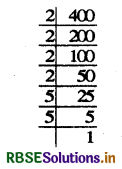
400 = 2 × 2 × 2 × 2 × 5 × 5
∴ \(\sqrt{400}\) = 2 × 2 × 5 = 20
(iii) 1764
Answer:
1764 - By prime factorisation,

1764 = 2 × 2 × 3 × 3 × 7 × 7
∴ \(\sqrt{1764}\) = 2 × 3 × 7 = 42
(iv) 4096
Answer:
4096 - By prime factorisation,
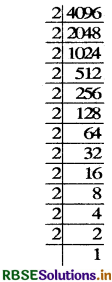
4096 = 2 × 2 × 2 × 2 × 2 × 2 × 2 × 2 × 2 × 2 × 2 × 2
∴ \(\sqrt{4096}\) = 2 × 2 × 2 × 2 × 2 × 2 = 64
(v) 7744
Answer:
7744 - By prime factorisation,
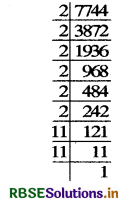
7744 = 2 × 2 × 2 × 2 × 2 × 2 × 11 × 11
∴ \(\sqrt{7744}\) = 2 × 2 × 2 × 11 = 88

(vi) 9604
Answer:
9604 - By prime factorisation,
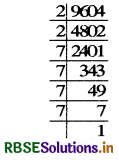
9604= 2 × 2 × 7 × 7 × 7 × 7
∴ \(\sqrt{9604}\) = 2 × 7 × 7 = 98
(vii) 5929
Answer:
5929 - By prime factorisation,
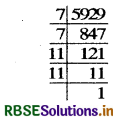
5929 = 7 × 7 × 11 × 11
∴ \(\sqrt{5929}\) = 7 × 11 = 77
(viii) 9216
Answer:
9216 - By prime factorisation,
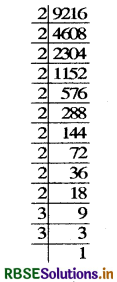
9216= 2 × 2 × 2 × 2 × 2 × 2 × 2 × 2 × 2 × 2 × 3 × 3
∴ \(\sqrt{9216}\) = 2 × 2 × 2 × 2 × 2 × 3 = 96
(ix) 529
Answer;
529 - By prime factorisation,

529 = 23 × 23
∴ \(\sqrt{529}\) = 23
(x) 8100
Answer:
8100 - By prime factorisation

8100 = 2 × 2 × 3 × 3 × 3 × 3 × 5 × 5
∴ \(\sqrt{8100}\) = 2 × 3 × 3 × 5 = 90

Question 5.
For each of the following numbers, find the smallest whole number by which it should be multiplied so as to get a perfect square number. Also find the square root of the square number so obtained.
(i) 252
Answer:
By prime factorisation,
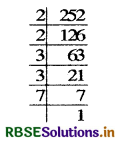
252 = 2 × 2 × 3 × 3 × 7
Here, in order to get a perfect square, one more 7 is required.
So, the given number should be multiplied by 7 to make the product a perfect square.
∴ 252 × 7 = 1764 is a perfect square.
Thus, 1764 = 2 × 2 × 3 × 3 × 7 × 7
∴ \(\sqrt{1764}\) = 2 × 3 × 7 = 42
(ii) 180
Answer:
By prime factorisation,

180 = 2 × 2 × 3 × 3 × 5
Here, in order to get a perfect square, one more 5 is required.
So, the given number should be multiplied by 5 to make the product a perfect square.
∴ 180 × 5 = 900 is a perfect square.
∴ \(\sqrt{900}\) = 2 × 3 × 5 = 30
(iii) 1008
Answer:
By prime factorisation,
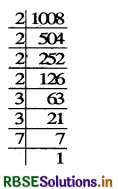
1008 = 2 × 2 × 2 × 2 × 3 × 3 × 7
Here, in order to get a perfect square one more 7 is required.
So, the given number should be multiplied by 7 to make the product a perfect square.
∴ 1008 × 7= 7056 is a perfect square
∴ \(\sqrt{7056}\) = 2 × 2 × 3 × 7 = 84
(iv) 2028
Answer:
By prime factorisation,

2028 = 2 × 2 × 3 × 13 × 13
In order to get a perfect square, one more 3 is required.
So, the given number should be multiplied by 3 to make the product a perfect square.
∴ 2028 × 3= 6084
Thus 6084= 2 × 2 × 3 × 3 × 13 × 13
∴ \(\sqrt{6084}\) = 2 × 3 × 13 = 78
(v) 1458
Answer:
By prime factorisation,

1458 = 2 × 3 × 3 × 3 × 3 × 3 × 3
Here, in order to get a perfect square, one more 2 is required.
So, the given number should be multiplied by 2 to make the product a perfect square.
∴1458 × 2= 2916
∴\( \sqrt{2916}\) = 2 × 3 × 3 × 3 = 54
(vi) 768
Answer:
By prime factorisation,

768 = 2 × 2 × 2 × 2 × 2 × 2 × 2 × 2 × 3
Here, in order to get a perfect square, one more 3 is required.
So, the given number should be multiplied by 3 to make the product a perfect square.
∴ 768 × 3 = 2304

Question 6.
For each of the following numbers, find the smallest whole number by which it should be divided so as to get a perfect square. Also find the square root of the square number so obtained.
(i) 252
Answer:
By prime factorisation,
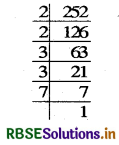
252 = 2 × 2 × 3 × 3 × 7
Since the prime factor 7 cannot be paired.
∴ The given number should be divided by 7.
\(\frac{252}{7}=\frac{2 \times 2 \times 3 \times 3 \times 7}{7}\)
= 2 × 2 × 3 × 3
= 36 is a perfect square.
and, \(\sqrt{36}=\sqrt{2 \times 2 \times 3 \times 3}\)
= 2 × 3 = 6
(ii) 2925
Answer:
By prime factorisation,
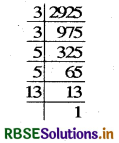
2925 = 3 × 3 × 5 × 5 × 13
Since the prime factor 13 cannot be paired,
∴ The given number should be divided by 13.
\(\frac{2925}{13}=\frac{3 \times 3 \times 5 \times 5 \times 13}{13}\)
= 3 × 3 × 5 × 5
= 225 is a perfect square
and \(\sqrt{225}=\sqrt{3 \times 3 \times 5 \times 5}\)
= 3 × 5 = 15
(iii) 396
Answer:
By prime factorisation,
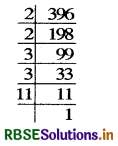
396 = 2 × 2 × 3 × 3 × 11
Since the prime factor 11 cannot be paired.
∴ The given number should be divided by 11.
\(\frac{396}{11}=\frac{2 \times 2 \times 3 \times 3 \times 11}{11}\)
= 2 × 2 × 3 × 3
= 36 is a perfect square.
\(\sqrt{36}=\sqrt{2 \times 2 \times 3 \times 3}\)
= 2 × 3 = 6

(iv) 2645
Answer:
By prime factorisation,

2645 = 5 × 23 × 23
Since the prime factor 5 cannot be paired.
∴ The given number should be divided by 5.
\(\frac{2645}{5}=\frac{5 \times 23 \times 23}{5}\)
= 23 × 23 = 529
529 is a perfect square,
and \(\sqrt{529}=\sqrt{23 \times 23}\) = 23
(v) 2800
Answer:
By prime factorisation,
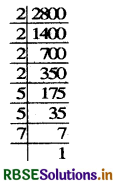
2800 = 2 × 2 × 2 × 2 × 5 × 5 × 7
Since the prime factor 7 cannot be paired.
∴ The given number should be .divided by 7.
\(\frac{2800}{7}=\frac{2 \times 2 \times 2 \times 2 \times 5 \times 5 \times 7}{7}\)
= 2 × 2 × 2 × 2 × 5 × 5
= 400 is a perfect square.
and \(\sqrt{400}=\sqrt{2 \times 2 \times 2 \times 2 \times 5 \times 5}\)
= 2 × 2 × 5 = 20
(vi) 1620
Answer:
By prime factorisation,

1620 = 2 × 2 × 3 × 3 × 3 × 3 × 5
Since the prime factor 5 cannot be paired.
∴ The given number should be divided by 5.
\(\frac{1620}{5}=\frac{2 \times 2 \times 3 \times 3 \times 3 \times 3 \times 5}{5}\)
= 2 × 2 × 3 × 3 × 3 × 3 = 324 is a perfect square.
and \(\sqrt{324}=\sqrt{2 \times 2 \times 3 \times 3 \times 3 \times 3}\) = 2 × 3 × 3 = 18
Question 7.
The students of Class VIII of a school donated Rs 2401 in all, for Prime Minister’s National Relief Fund. Each student donated as many rupees as the number of students in the class. Find the number of students in the class.
Answer:
Let x be the number of students in the class.
Therefore, the total money donated by students
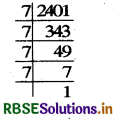
= ₹ (x × x) = ₹ x2
But it is given as ₹ 2401
∴ x2 = 2401
x = \(\sqrt{2401}\)
= \(\sqrt{7 \times 7 \times 7 \times 7}\)
= 7 × 7 = 49
Hence, the number of students in the class is 49.

Question 8.
2025 plants are to be planted in a garden in such a way that each row contains as many plants as the number of rows. Find the number of rows and the number of plants in each row.
Answer:
Let x be the number of rows and x be the number of plants in each row.
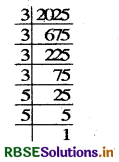
∴ The total number of plants
= x × x = x2
∵ Given number of plants = 2025
∴ x2 = 2025
= 3 × 3 × 3 × 3 × 5 × 5
⇒ x = \(\sqrt{2025}\)
= 3 × 3 × 5 = 45
Hence, the number of rows is 45 and the number of plants in each row is also 45.
Question 9.
Find the smallest square number that is divisible by each of the numbers 4, 9 and 10.
Answer:
We know that LCM is the smallest number divisible by all its factors.
Since LCM of 4, 9 and 10 = 2 × 2 × 9 × 5 = 180
But 180, is not a perfect square
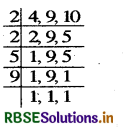
Again, 180 = 2 × 2 × 3 × 3 × 5
[∵ 9 = 3 × 3]
∵ The Number 5 is unpaired.
∴ [180] × 5 = [2 × 2 × 3 × 3 × 5] × 5
or 900 = 2 × 2 × 3 × 3 × 5 × 5
∵ The prime factors of 900 are paired.
∴ 900 is a perfect square.
Thus the required number = 900

Question 10.
Find the smallest square number that is divisible by each of the numbers 8, 15 and 20.
Answer:
We know that smallest number divisible by each of the numbers 8, 15 and 20 is their LCM., which is(2 × 2 × 5 × 2 × 3), i.e. 120.
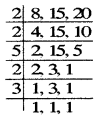
Now 120 = 2 × 2 × 2 × 3 × 5
To make it a perfect square, it must be multiplied by 2 × 3 × 5, i.e. 30
∴ Required number is 120 × 30 = 3600
